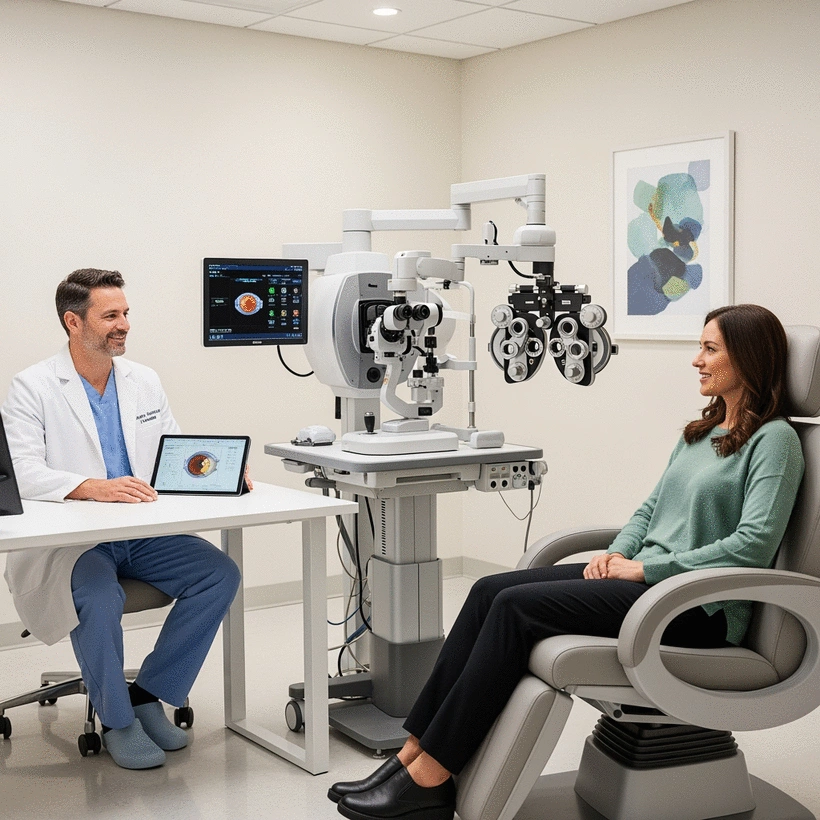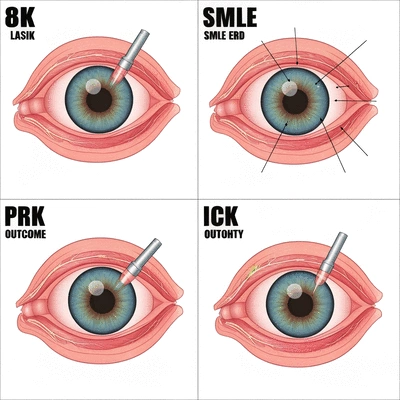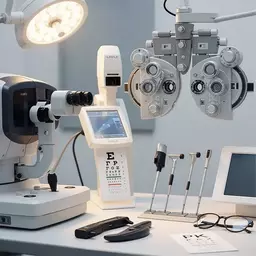Choosing Laser Eye Surgery Providers

Considering laser eye surgery? You're not alone. Many people are drawn to this innovative solution for clearer vision. But what do you truly need to know before making this significant decision?
What You Will Learn
- Laser eye surgery reshapes the cornea to improve vision, potentially eliminating the need for glasses or contacts.
- Understand the different types of laser eye surgeries: LASIK, SMILE, PRK, and ICL, each suited for different needs.
- Selecting a qualified surgeon is crucial; consider their certification, experience, and patient success rates.
- Research clinic reputations through patient reviews and recognized accreditations to ensure a safe experience.
- Prepare for consultations by having questions ready and discussing financing options to manage costs effectively.
Key Considerations for Laser Eye Surgery in Australia
Making an informed decision about laser eye surgery involves understanding the available procedures and carefully selecting a qualified clinic and surgeon. Below is a breakdown of these critical aspects. For a deeper dive into the financial aspects, consider understanding laser eye surgery costs.
Types of Laser Eye Surgery
- • LASIK: Most popular, corrects nearsightedness, farsightedness, astigmatism.
- • SMILE: Newer, less invasive, small incision.
- • PRK: Ideal for thin corneas, reshapes surface.
- • ICL: Implantable lens, for those not eligible for laser.
Criteria for Selecting Quality Providers
- • Surgeon Credentials: Board certification, years of experience, advanced training.
- • Clinic Reputation: Positive patient reviews, accreditations, transparency on success rates.
- • Consultation Process: Opportunity to ask questions, discuss concerns, understand available procedures.
- • Preparation: Follow pre-operative instructions closely for smooth procedure and recovery.
Understanding Laser Eye Surgery in Australia: An Overview
When considering vision correction, many people turn to laser eye surgery as a viable option. But what exactly is it, and why should you consider it? Laser eye surgery employs advanced technology to reshape the cornea, allowing light to focus properly on the retina. This can significantly reduce or even eliminate the need for glasses or contact lenses, making it an appealing solution for many patients.
At VisionCost Insights, I believe that understanding the basics of laser eye surgery can empower you to make informed decisions about your vision health. Whether you're tired of dealing with contacts or just want the freedom of clearer vision, this procedure could be a key step in your journey.
What is Laser Eye Surgery and Why Consider It?
Laser eye surgery encompasses a range of procedures designed to improve vision. Many people consider it for various reasons:
- Desire for freedom from glasses and contacts
- Improved quality of life and convenience
- Increased confidence and independence
These factors often lead patients to explore their options in laser eye surgery. With the right knowledge, you can determine whether this is the right path for you. Understanding the benefits and potential drawbacks is crucial for making a well-rounded decision!

Types of Laser Eye Surgery: LASIK, SMILE, PRK, and ICL
There are several types of laser eye surgeries available, each with unique features and benefits:
- LASIK: The most popular method, used to correct nearsightedness, farsightedness, and astigmatism.
- SMILE: A newer technique that requires only a small incision and is less invasive.
- PRK: Ideal for patients with thin corneas, this method involves reshaping the surface of the cornea.
- ICL (Implantable Collamer Lens): A lens implanted in the eye, suitable for those who are not candidates for laser correction.
Each option has its advantages and considerations, making it essential to consult with an experienced surgeon to find the best fit for your needs. At VisionCost Insights, I encourage you to explore laser eye surgery types explained, as understanding them can guide you toward clearer vision!
Criteria for Selecting Quality Clinics and Surgeons
Selecting the right clinic and surgeon is pivotal to your laser eye surgery experience. It’s important to ensure you’re in competent hands to achieve the best possible outcomes.
Evaluating Surgeon Credentials, Qualifications, and Experience
Your surgeon’s credentials play a significant role in your surgery's success. Here are key factors to consider:
- Board certification in ophthalmology
- Years of experience specifically in laser eye surgery
- Advanced training in the specific procedures offered
Choosing a qualified surgeon ensures you receive high-quality care and increases your chances of a successful outcome. Don’t hesitate to ask potential surgeons about their training and experience during your initial consultations!
Assessing Clinic Reputation and Patient Reviews: Insights from Eye Care Australia
The reputation of the clinic is equally important. Look for the following:
- Positive patient reviews and testimonials
- Accreditations and certifications from recognized organizations
- Transparency about success rates and complication rates
Utilizing resources like Eye Care Australia can provide valuable insights into clinic reputations. A well-regarded clinic will be open about its practices and patient outcomes, helping you make a more informed choice.
Interactive Poll: Your Thoughts on Laser Eye Surgery
As you consider the information provided about laser eye surgery, we’d love to hear your thoughts! What aspect of the procedure excites you the most?
Making an Informed Decision: Your Path to Clear Vision
As you embark on your journey toward clearer vision, making an informed decision about laser eye surgery is paramount. At VisionCost Insights, I encourage you to take the time to research and evaluate your options. This ensures that you select a clinic and surgeon that align with your personal needs and financial considerations. Here’s a quick rundown of best practices to keep in mind:
- Verify surgeon qualifications and experience.
- Read patient reviews and testimonials.
- Understand the technologies and techniques offered.
- Assess the clinic's overall reputation.
By following these guidelines, you can feel more confident in your choice and rest assured that you’re on the right path toward achieving your vision goals!

Next Steps: Booking Consultations, Understanding Consultation Fees, and Preparing for Surgery
Once you've narrowed down your options, the next step is to book consultations with your top choices. During these meetings, you’ll have the opportunity to ask questions, discuss your concerns, and gain a deeper understanding of the procedures available. Each clinic may have varying consultation fees, so be sure to inquire about these costs upfront.
- Prepare a list of questions to ask during your consultation.
- Request detailed information about the procedure, recovery, and potential risks.
- Discuss financing options and payment plans.
Preparing for your surgery is equally essential. Make sure to follow your surgeon's pre-operative instructions closely, as this will help ensure a smooth procedure and recovery. Remember, your vision is worth the investment, and for more detailed guidance, consider preparing for laser eye surgery!
Connect with Experts: Resources and Further Information
To further assist you on your journey, here are some valuable resources that can help you connect with leading clinics and surgeons in Australia:
- Australian Society of Ophthalmology - A great resource for finding qualified eye care professionals.
- Recommended Clinics - A curated list of clinics with excellent reputations.
- Surgeon Profiles - Detailed profiles highlighting the expertise and patient outcomes of various surgeons.
Utilizing these resources will not only enhance your knowledge but also empower you to make a well-informed decision regarding your laser eye surgery.
FAQs: Addressing Common Concerns About Laser Eye Surgery and Patient Education
As you gather information, you might come across common questions and concerns about laser eye surgery. Here’s a quick list of frequently asked questions to help clarify some of these topics:
- What are the typical recovery times for different procedures?
- Are there risks or complications associated with laser eye surgery?
- How long do the results of the surgery last?
At VisionCost Insights, I’m committed to demystifying these questions and helping you feel empowered on your vision correction journey. If you have additional queries, don’t hesitate to reach out—I’m here to help!
Frequently Asked Questions About Laser Eye Surgery
- What is laser eye surgery?
- Laser eye surgery uses advanced technology to reshape the cornea, aiming to correct vision problems like nearsightedness, farsightedness, and astigmatism, thereby reducing or eliminating the need for glasses or contact lenses.
- What types of laser eye surgery are available?
- The main types include LASIK (most popular for various corrections), SMILE (a newer, less invasive technique), PRK (ideal for thin corneas), and ICL (Implantable Collamer Lens, for those unsuitable for laser correction).
- How do I choose a qualified surgeon and clinic?
- Look for surgeons with board certification, extensive experience in laser eye surgery, and advanced training. For clinics, consider positive patient reviews, accreditations, and transparency regarding success and complication rates. Resources like Eye Care Australia can also be helpful.
- What should I expect during a consultation?
- During a consultation, you should expect to discuss your vision concerns, learn about suitable procedures, and ask questions. Be aware that some clinics may charge consultation fees. It’s also an opportunity to discuss financing options.
- How long do the results of laser eye surgery last?
- For most patients, the results of laser eye surgery are long-lasting. However, natural age-related changes to vision, suchs as presbyopia or cataracts, may occur later in life and are not prevented by laser eye surgery.
- Are there any risks associated with laser eye surgery?
- As with any surgical procedure, there are potential risks, including dry eyes, glare, halos, or under/over-correction. A thorough consultation with your surgeon will help you understand specific risks relevant to your eyes and chosen procedure.
Recap of Key Points
Here is a quick recap of the important points discussed in the article:
- Laser eye surgery can reshape the cornea to improve vision, potentially eliminating the need for glasses or contact lenses.
- Different types of laser eye surgery include LASIK, SMILE, PRK, and ICL, each with unique benefits and considerations.
- It's crucial to evaluate surgeon credentials, clinic reputation, and patient reviews when selecting where to have the procedure.
- Making an informed decision involves researching options and understanding the associated costs and technologies.
- Preparing for consultations and following pre-operative instructions are essential steps for a successful surgery.








